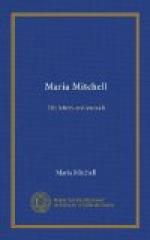“While Dr. Somerville was eagerly talking of these things, Mrs. Somerville came tripping into the room, speaking at once with the vivacity of a young person. She was seventy-seven years old, but appeared twenty years younger. She was not handsome, but her face was pleasing; the forehead low and broad; the eyes blue; the features so regular, that in the marble bust by Chantrey, which I had seen, I had considered her handsome.
“Neither bust nor picture, however, gives a correct idea of her, except in the outline of the head and shoulders.
“She spoke with a strong Scotch accent, and was slightly affected with deafness, an infirmity so common in England and Scotland.
“While Mrs. Somerville talked, the old gentleman, seated by the fire, busied himself in toasting a slice of bread on a fork, which he kept at a slow-toasting distance from the coals. An English lady was present, learned in art, who, with a volubility worthy of an American, rushed into every little opening of Mrs. Somerville’s more measured sentences with her remarks upon recent discoveries in her specialty. Whenever this occurred, the old man grew fidgety, moved the slice of bread backwards and forwards as if the fire were at fault, and when, at length, the English lady had fairly conquered the ground, and was started on a long sentence, he could bear the eclipse of his idol no longer, but, coming to the sofa where we sat, he testily said, ’Mrs. Somerville would rather talk on science than on art.’
“Mrs. Somerville’s conversation was marked by great simplicity; it was rather of the familiar and chatty order, with no tendency to the essay style. She touched upon the recent discoveries in chemistry or the discovery of gold in California, of the nebulae, more and more of which she thought might be resolved, and yet that there might exist nebulous matters, such as compose the tails of comets, of the satellites, of the planets, the last of which she thought had other uses than as subordinates. She spoke with disapprobation of Dr. Whewell’s attempt to prove that our planet was the only one inhabited by reasoning beings; she believed that a higher order of beings than ourselves might people them.
“On subsequent visits there were many questions from Mrs. Somerville in regard to the progress of science in America. She regretted, she said, that she knew so little of what was done in our country.
“From Lieutenant Maury, alone, she received scientific papers. She spoke of the late Dr. (Nathaniel) Bowditch with great interest, and said she had corresponded with one of his sons. She asked after Professor Peirce, whom she considered a great mathematician, and of the Bonds, of Cambridge. She was much interested in their photography of the stars, and said it had never been done in Europe. At that time photography was but just applied to the stars. I had carried to the Royal Astronomical Society the first successful photograph of a star. It was that of Mizar and Alcor, in the Great Bear. (Since that time all these things have improved.)




